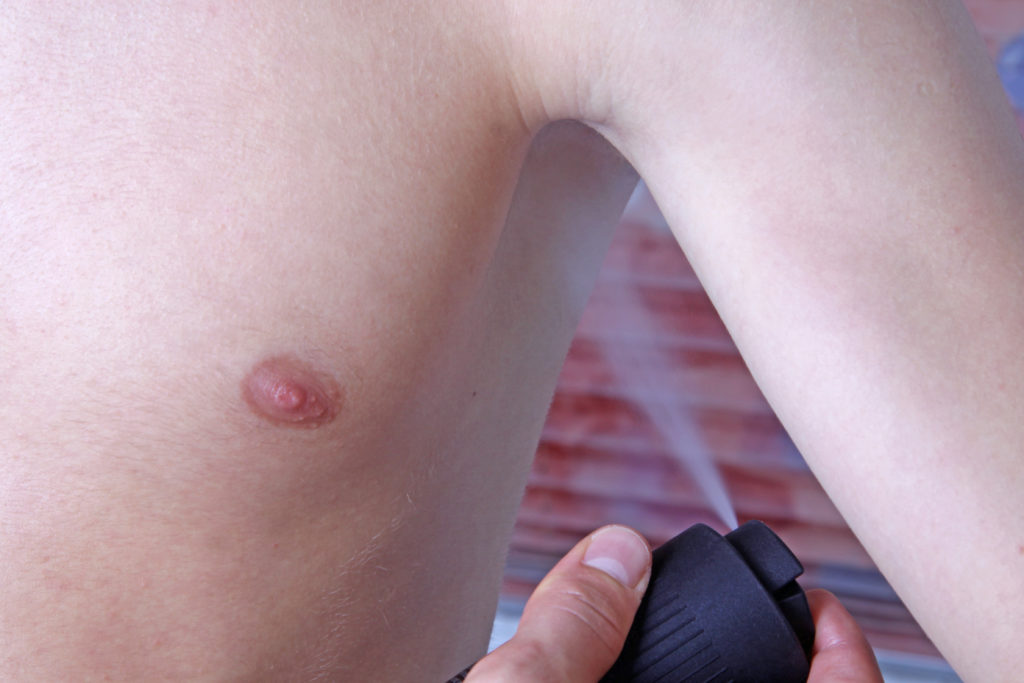Cardiac arrest: a teenager died after intentional Inhalation of aerosol deodorant
The Dutch public health experts, report on a youth who died after intentional Inhalation of aerosol deodorant. The Teenager, who used the Spray to Intoxicate, suffered a cardiac arrest. Doctors now warn against the deadly risks posed by household products, which can be used to Inhale miss.
A Teenager wanted to be intoxicated
The Inhalation of deodorant spray, to be “high”, it can be deadly, Doctors warn in the journal “BMJ”. In the journal “BMJ Case Reports” describe the medical case of a 19-Year-old, who inhaled in the absence of other drugs butane from a Deodorant Spray and a cardiac arrest suffered.

Life-Threatening Deodorants
Health experts have warned before of the dangers by deodorant, because the Inhalation of a lot of Deo-Gas can lead to life-threatening cardiovascular disorders, respiratory paralysis and Suffocation.
But unfortunately, these Sprays are alienated from the young people again and again, for Sniffing purpose, in order to become intoxicated.
Especially in the case of younger teenagers Deo is a very dangerous gateway drug, because it is cheap and available everywhere.
In the past, many young people ended up therefore in the hospital and a young girl from the UK died of this a few years ago.
Also the in the in the “BMJ Case Reports” described the 19-Year-old cost the Inhalation of aerosol deodorant, the lives.
Household products for improper Inhale
Deodorant Spray is one of several common household products, including paint thinner, and hairspray, contain substances that can be used for abusive Inhale, the authors write.
This is mainly for teenagers from disadvantaged backgrounds popular. In the USA alone, up to 125 deaths would be recorded, therefore, each and every year.
Inhalation abuse comes in three forms: direct Inhalation, known as Sniff; Breathe through a piece of clothing that is referred to as “Huffing” ; and “Bagging”, in which a plastic bag or a balloon is used.
Volatile Compounds, aerosols, and compressed gases are, according to the authors of all the possible candidates for abuse.
Doctors were not able to help the Teenager
In the described case report a 19-year-old man, was treated in a drug rehabilitation clinic for abuse of ketamine, Cannabis, suffered a relapse.
He put a towel over the head and breathing in deodorant, in order to become intoxicated.
The Doctors say he quickly became Hyper-active, collapsed and had to be resuscitated. The Patient was brought to ICU, where he was placed in an induced medical coma.
However, his condition did not improve. According to Doctors, further treatment would have been pointless, which is why it has been omitted. Shortly thereafter, the young man died.
Especially butane can be dangerous
The authors restrict that your report applies only to a case, but for the past 40 years there have been reports about cardiac arrest after Inhalation of volatile substances, where the first case of death was the Inhalation of Deodorant Spray from the year 1975.
“The main toxin in the Inhalation with aerosol deodorant butane. Butane is a hydrocarbon, which are commonly used in Propellants for sprayable household products “, they write.
“Hydrocarbons are lipophilic (fat soluble), and cross, therefore, easy for the air-to – blood and blood-brain barrier. It [butane] is dissolved in tissues with a high fat content, such as nervous system, adipose tissue, liver, and kidneys,“ explained the expert.
You point out: “The abuse of volatile substances is one of the least known methods to achieve a noise-like state by drugs.”
The authors warn to conclude that young people with drug abuse may be in isolated environments, such as, for example, in drug rehab or in prison, they are especially vulnerable because there is usually hardly any drugs, but household products are available that you could use are more likely to abuse. (ad)
